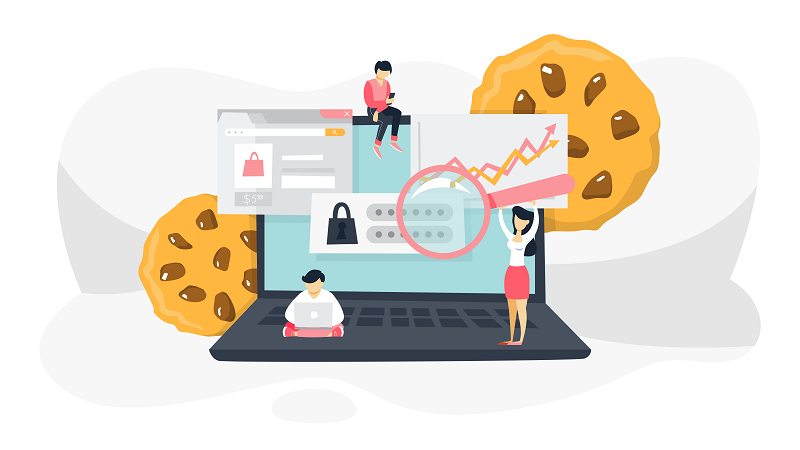The internet is moving at an accelerated rate. It is focusing on convenience and efficiency rather than working on getting the job done. It is said that the internet has now become an industrial revolution itself, considering how efficient and fast it is moving. With that being said, many of the current users are feeling the efficiency and convenience, from being able to open any page on the internet within a couple of seconds, to be able to turn off your computer and come back right to where you left it. Common understandings of how the internet has made things more convenient are shown through a simple login: one can log in to a site, and can constantly re-enter the site without having to constantly put their login credentials over and over. The question is now posed amongst many: how am I able to simply enter a site without putting my login credentials, and the site will simply let me in? Nowadays, these are well known as cookies.
Whenever you enter a website, you may notice a small pop-up, something that says, “We would like to use cookies to ensure the best performance on our site”. To keep things simple, cookies are known as your digital footprint, your identification card. As soon as you log into a website, whether it is websites like Google, Spotify, or Netflix, you give the website permission to store your login credentials into those cookies, so that every time you attempt to enter that specified site, you will no longer need to enter your credentials. Simply the cookies will be those login credentials, and it will allow you the use the site logged in. This takes convenience to another level because consumers are constantly looking for convenience, and if a consumer is able to see the simplicity in a process like this, they will be more inclined to stay on the site. However, many are starting to believe that cookies are becoming a bit of an issue, especially for security. Since cookies are capable of specifying your computer to various websites, it is true that if someone does in theory get ahold of these particular cookies, then they themselves are able to take control of everything you are logged into. In different terms, if you accidentally give someone all of your computer cookies, then the data the cookies accompany falls into the other person’s hands. Which, in other words, means that they are capable of logging into dozens of accounts without even needing to know your account credentials. Fortunately, it is not that easy to steal cookies, and many attackers choose to directly hack credentials rather than hacking cookies, due to the fact that cookies are fairly difficult to hack, but when are the cases in which cookies can be stolen? If you accidentally give a hacker your cookies, they are capable of hijacking your browsing session. This allows them permission to access financial information, social media, accounts, etc. It is common to see hackers taking over social media accounts to promote their own cryptocurrency wallets, which can lead to an overall upturn in their own money and a downturn in your social status. However, there are ways to prevent your cookies from being stolen:
Prevent Your Cookies Being Stolen:
- Avoid going onto websites that ask you to copy something from your browser’s console or terminal (cybercriminals often ask you to something of the such if they wish to take your cookies, they will ask you to enter the console of your browser and copy-paste the cookies in it, huge red flag)
- Avoid entering websites without an SSL certificate (SSL certificates are generally a sign of privacy, and going onto sites without an SSL can be a red flag as well)
- Install an effective anti-virus (although this is a common one, good, effective anti-viruses will spot red flags immediately, and alert you to prevent you from getting something stolen of yours). Malwarebytes is fairly popular.
- Have a security extension installed on the browser itself (if someone uses your cookies to hijack your browser session, that can be an issue. If you are using a browser that allows extension installation, there is a high chance that there is a security plugin that prevents you from going onto popular sites that are known for cookie stealing and manipulation)
However, sometimes you are not so lucky. Sometimes even with the proper precautions, you still end up getting your cookies stolen. There are a few things to note/remember if something like this happens. If you are lucky, you have realized that you have accidentally given your cookies away before any major damage has occurred. This means you have time. Without hesitation, change the password to all of the accounts you know, all of them. Or at the very least, change all the accounts to the top ones at your priority. This means banking accounts, social media accounts, etc. Although social media accounts and youtube channels may not seem like a big deal, hackers choose to take advantage of these and attempt to post their own cryptocurrency scams on there. In fact, wired made reports since 2019, and how YouTube channels have been turned into broadcasting cryptocurrency scams and even auctioning off cryptocurrency accounts. Although the theories of how this happened are mainly made of theories of viruses and backdoors, the theory of cookies being stolen and a session being hijacked is very much probable.
These may be harming themselves, but there are ways to keep yourself safe if something like this happens. Although changing your password may help, another good measure to take is changing your two-factor authentication method. With this being said, changing your two-factor authentication method may help increase the security overall. If you are almost certain that you have been impacted by your cookies being stolen, then it is highly recommended that you log out of your account from that browser, and log out of the session completely. To ensure extra safety and privacy, revoke all trusted devices if you are using a google account. The reason for this particular measure is to make sure the cookies become somewhat inactive; once this is complete, it gives the cybercriminal a more difficult time accessing all of your accounts, meaning they may let you go off their list. Though with this being said, it is almost impossible to protect yourself fully. Once the hacker is capable of gaining control of your session, they are capable of controlling whatever cookies you have, allowing them to access a variety of websites under your identity.
Now cookies are not to be seen as a danger, rather they are known to be the future. Although cookies carry a large amount of data, the future of cookies is a whole other level. In fact, in 2022 it is said that Google is removing and phasing out of third-party cookies, which are essential cookies that are dedicated to ad specialization and user preference. Even companies such as Firefox and Safari have taken action, and have phased out of third-party cookies. While it is true cookies are not planning on going anywhere anytime soon, we can expect to see the privacy of cookies change drastically, further expanding and modifying the idea to become the near future.



Leave A Comment